“Scientists face critical moments on a daily basis, which help them to grow into real scientists”
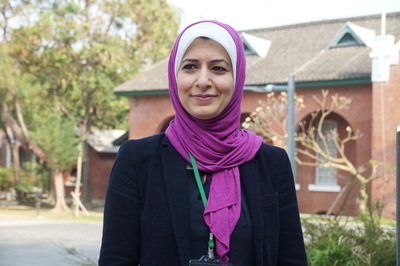
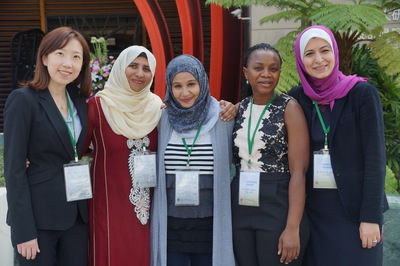
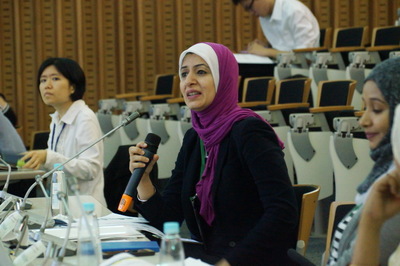
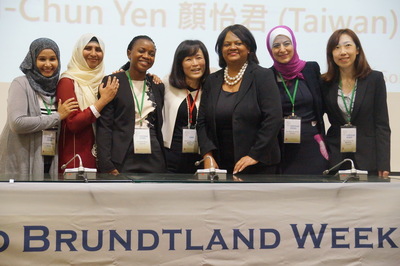
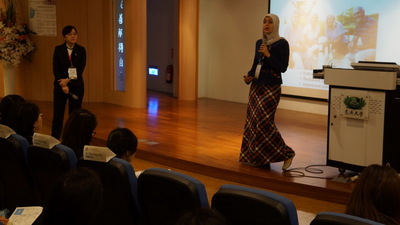
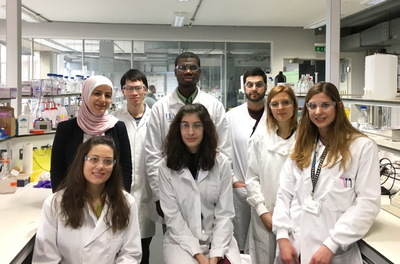
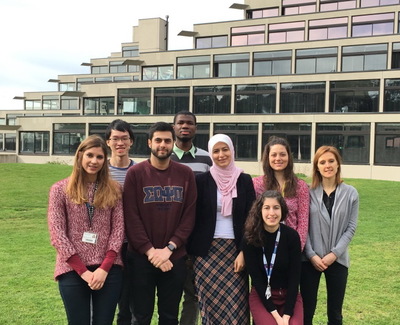
Wafa Al-Jamal, a research fellow in the University of East Anglia, working on developing nanomedicines to target metastatic cancer. She is currently a visiting professor at Guizhou Medical School, Guiyang, China.
Among the five Gro Brundtland Award recipients this year, Al-Jamal says that she is honored to receive the award in Taiwan. “Gro Brundtland Award is one of the few awards that recognize women contribution to science and sustainable development.”
“It is a great achievement, and it will definitely help me to establish worldwide collaborations, which aim to strengthen the links and knowledge exchange between researchers in the UK and developing countries,” she adds.
Al-Jamal whose research interests focus on engineering novel nanomaterials for biomedical applications. “I am eager to exploit every single potential that nanomedicine could offer in the area of cancer, which includes diagnosis, therapy, and monitoring of cancer,” she says.
According to Al-Jamal, the main problems with chemotherapy are the side effects and the fact that its efficacy is limited because drugs do not accumulate to therapeutic concentrations within individual cancer cells.
“In my lab, we are working on exploring a wide range of drug delivery systems, such as liposomes, nanoparticles, and exosomes, to improve drug delivery to cancer tissues, with a special interest in the area of prostate cancer,” says Al-Jamal.
“We expect this new approach of drug delivery to increase specificity to cancer cells, which will reduce undesirable systemic side effects, and allow patients to live longer with a better quality of life,” she adds.
Al-Jamal encourages scientists to explore collaborative work. Her long-term research career is to facilitate the translation of nanoparticle-based therapeutics from the lab to the clinic.
She highlights the importance of translating science into a product, saying, “People will ask you about the impact of your research because basic science is interesting but to be able to show that your work is beneficial to the society you need to show that impact.”
Al-Jamal continues, “Whether you’re formulating a new product or developing a new machine or software or introducing your new policy, or changing the way of treating certain diseases, if you have high impact, then you succeed in your career and attract more funding to develop new ideas.”
“What we lack sometimes is the common interest between industry and research or academia,” Al-Jamal says.
“For industry, they are maybe after money, after final product; for science, we are interested in to know why this is happening, even if we don’t have a product because this is the curiosity you have to understand what is happening,” she adds.
“Balancing fifty fifty to understand what you do and find someone to join you to develop this into a final product would be very good,” Al-Jamal says.
Al-Jamal says that she is very keen working with industry partners, “but it’s very difficult because it’s very competitive now, you need to convince them what you offer is better than someone else.”
Her love for science started early, Al-Jamal says that she was always interested in science. After finishing her undergraduate degree in Pharmacy in Jordan, she was awarded an Overseas Research Studentship Award from the University of London, UK, to pursue her PhD at the Centre for Drug Delivery Research at the School of Pharmacy, London.
Her PhD project focused on exploring nanotechnology to improve drug delivery to cancer tissues. “I liked the nanomedicine field which is multidisciplinary and interdisciplinary research. Since then, I decided to continue in the same research area,” Al-Jamal says.
“At the start of my PhD, I thought that lacking certain skills, such as critical thinking, scientific writing, and certain experimental skills, would be the only challenges that people could face in science,” she says.
“Soon after, I realized that scientists face critical moments on a daily basis, which help them to grow into real scientists,” she adds.
“As I progress in my work, I realized that financial support is essential to establish my own group and maintain my research interest. This was the driving force for me to apply and secure my 5-year Prostate Cancer UK (PCUK) career development fellowship, followed by more successful grants and studentships,” says Al-Jamal.
As a mentor and teacher, Al-Jamal says that she would advise young scientists to work hard to achieve their goals. “Self-motivation and determination, and taking every single opportunity to learn are the key skills that scientists need to succeed in their career.”
Talking about the training of female scientists in her country, Al-Jamal says, “Jordan has already recognized women contribution to science. During my undergraduate study, I met many female lecturers and scientists that excelled in their academic jobs. Over years, things have improved to support women in science to balance their family life with career development. However, in my opinion, addition supports are still needed to help them developing their leadership skills to be internationally recognized as leaders in their field.”
“Currently, I am working in the UK, where I am very impressed with the support that female scientists receive to ensure their career progression and development,” says Al-Jamal who was the GlaxoSmithKline Emerging Scientist Award winner for 2015 for her contribution in the field of Cancer Nanomedicine.
Among the five Gro Brundtland Award recipients this year, Al-Jamal says that she is honored to receive the award in Taiwan. “Gro Brundtland Award is one of the few awards that recognize women contribution to science and sustainable development.”
“It is a great achievement, and it will definitely help me to establish worldwide collaborations, which aim to strengthen the links and knowledge exchange between researchers in the UK and developing countries,” she adds.
Al-Jamal whose research interests focus on engineering novel nanomaterials for biomedical applications. “I am eager to exploit every single potential that nanomedicine could offer in the area of cancer, which includes diagnosis, therapy, and monitoring of cancer,” she says.
According to Al-Jamal, the main problems with chemotherapy are the side effects and the fact that its efficacy is limited because drugs do not accumulate to therapeutic concentrations within individual cancer cells.
“In my lab, we are working on exploring a wide range of drug delivery systems, such as liposomes, nanoparticles, and exosomes, to improve drug delivery to cancer tissues, with a special interest in the area of prostate cancer,” says Al-Jamal.
“We expect this new approach of drug delivery to increase specificity to cancer cells, which will reduce undesirable systemic side effects, and allow patients to live longer with a better quality of life,” she adds.
Al-Jamal encourages scientists to explore collaborative work. Her long-term research career is to facilitate the translation of nanoparticle-based therapeutics from the lab to the clinic.
She highlights the importance of translating science into a product, saying, “People will ask you about the impact of your research because basic science is interesting but to be able to show that your work is beneficial to the society you need to show that impact.”
Al-Jamal continues, “Whether you’re formulating a new product or developing a new machine or software or introducing your new policy, or changing the way of treating certain diseases, if you have high impact, then you succeed in your career and attract more funding to develop new ideas.”
“What we lack sometimes is the common interest between industry and research or academia,” Al-Jamal says.
“For industry, they are maybe after money, after final product; for science, we are interested in to know why this is happening, even if we don’t have a product because this is the curiosity you have to understand what is happening,” she adds.
“Balancing fifty fifty to understand what you do and find someone to join you to develop this into a final product would be very good,” Al-Jamal says.
Al-Jamal says that she is very keen working with industry partners, “but it’s very difficult because it’s very competitive now, you need to convince them what you offer is better than someone else.”
Her love for science started early, Al-Jamal says that she was always interested in science. After finishing her undergraduate degree in Pharmacy in Jordan, she was awarded an Overseas Research Studentship Award from the University of London, UK, to pursue her PhD at the Centre for Drug Delivery Research at the School of Pharmacy, London.
Her PhD project focused on exploring nanotechnology to improve drug delivery to cancer tissues. “I liked the nanomedicine field which is multidisciplinary and interdisciplinary research. Since then, I decided to continue in the same research area,” Al-Jamal says.
“At the start of my PhD, I thought that lacking certain skills, such as critical thinking, scientific writing, and certain experimental skills, would be the only challenges that people could face in science,” she says.
“Soon after, I realized that scientists face critical moments on a daily basis, which help them to grow into real scientists,” she adds.
“As I progress in my work, I realized that financial support is essential to establish my own group and maintain my research interest. This was the driving force for me to apply and secure my 5-year Prostate Cancer UK (PCUK) career development fellowship, followed by more successful grants and studentships,” says Al-Jamal.
As a mentor and teacher, Al-Jamal says that she would advise young scientists to work hard to achieve their goals. “Self-motivation and determination, and taking every single opportunity to learn are the key skills that scientists need to succeed in their career.”
Talking about the training of female scientists in her country, Al-Jamal says, “Jordan has already recognized women contribution to science. During my undergraduate study, I met many female lecturers and scientists that excelled in their academic jobs. Over years, things have improved to support women in science to balance their family life with career development. However, in my opinion, addition supports are still needed to help them developing their leadership skills to be internationally recognized as leaders in their field.”
“Currently, I am working in the UK, where I am very impressed with the support that female scientists receive to ensure their career progression and development,” says Al-Jamal who was the GlaxoSmithKline Emerging Scientist Award winner for 2015 for her contribution in the field of Cancer Nanomedicine.
Provider:
News Center
Date:
2017-03-18